Firstly, goals provide direction and purpose, helping clients define what they want to accomplish and why it matters to them. This helps with sustaining motivation, maintaining focus and commitment to their health journey, even in the face of any challenges that arise along the way. Alongside that, setting specific and measurable goals allows for tracking progress and celebrating victories along the way, which brings a sense of accomplishment. Additionally, personalised health goals enable individuals to tailor their approach to their unique needs and preferences, increasing the likelihood of success.
In this blog post, we’ll explore the SMART goal framework and how it can be used to set goals for guaranteed success in your health journey.
Table of Contents
Understanding the SMART Goal Framework
The SMART goal framework provides a structured approach to goal setting, ensuring that goals are Specific, Measurable, Achievable, Relevant, and Time-bound.

- Specific:
-
- Clearly define what you want to achieve with your goal.
- Ask yourself: What exactly do I want to accomplish? Why is it important? Who is involved? Where will it take place?
-
- Measurable:
-
- Establish criteria for measuring progress toward your goal.
- Determine how you will track your progress and know when you have achieved your goal.
- Set concrete benchmarks or milestones to monitor your progress along the way.
-
- Achievable:
-
- Ensure that your goal is realistic and attainable.
- Consider factors such as time, resources, and constraints when setting your goal.
- Break down larger goals into smaller, manageable steps to make them more achievable.
-
- Relevant:
-
- Align your goal with your values, priorities, and long-term objectives.
- Ensure that your goal is relevant to your overall health and wellness journey.
- Ask yourself: Does this goal support my broader health goals and aspirations?
-
- Time-bound:
-
- Set a specific timeframe for achieving your goal.
- Establish deadlines or target dates to create a sense of urgency and motivation.
- Break your goal down into smaller timeframes, such as weekly or monthly targets.
-
Implementing the SMART Goal Framework
Now that you understand the components of the SMART goal framework, it’s time to put it into action. Here’s how you can use the SMART framework to set goals for your health journey:
Example Goal: “I want to improve my overall health by following a personalised meal plan from equ.”
-
- Specific: Define what improving overall health means to you and why it’s important.
- Measurable: Track your progress by monitoring changes in weight, energy levels, and overall well-being. You can do this on the equ app by submitting weekly check-ins and self-tracking in your food diary.
- Achievable: Ensure that following a personalised meal plan is realistic and attainable for you.
- Relevant: Align following a healthy meal plan with your broader health goals and aspirations.
- Time-bound: Set a timeframe for starting and sticking to your personalised meal plan, such as within the next month or throughout the course of your subscription.


